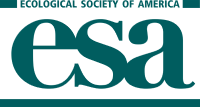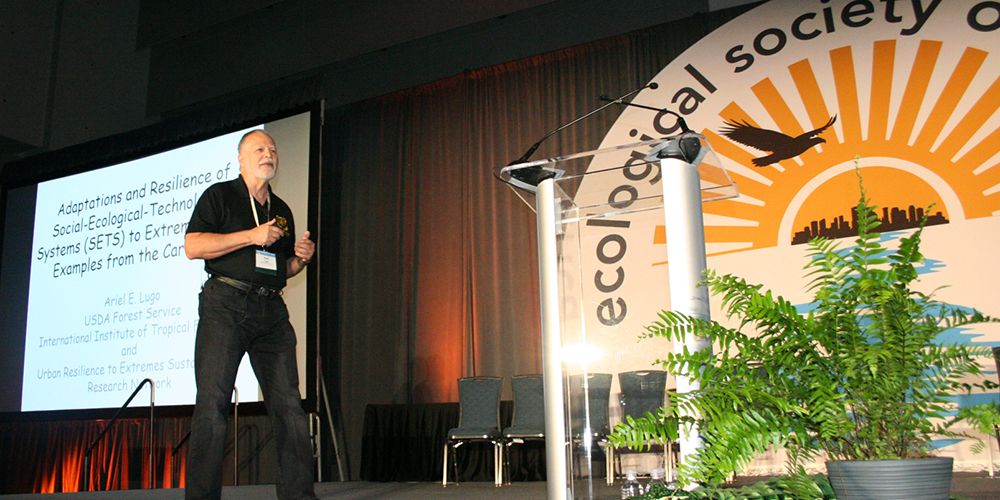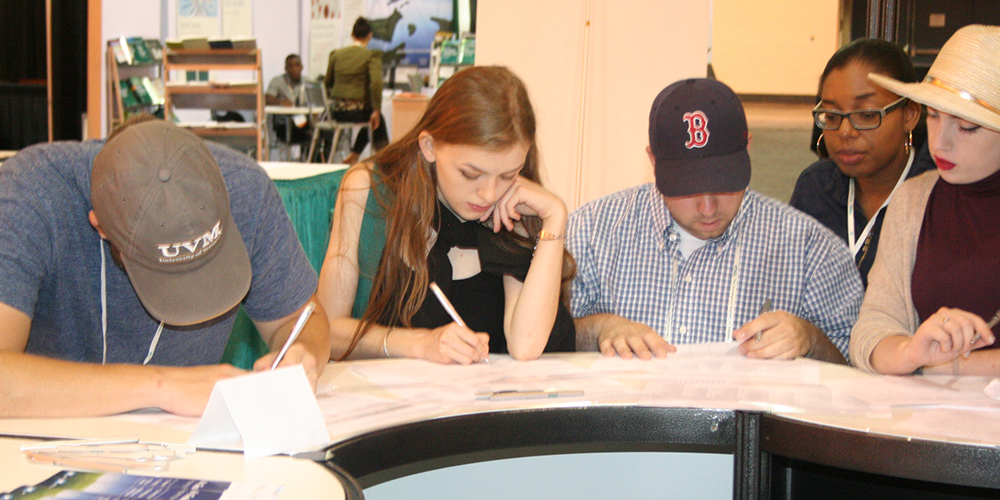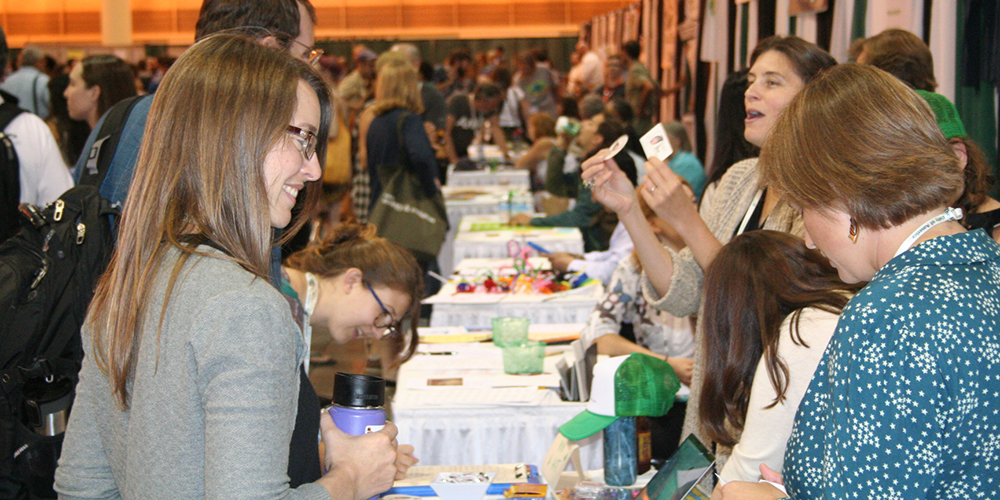From Aug. 5-10, more than 3,500 ecologists, educators, students, researchers, enthusiasts and more gathered in New Orleans for six days of networking, celebrating and sharing science. The meeting’s theme was Extreme events, ecosystem resilience and human well-being, and it was honored throughout the meeting.
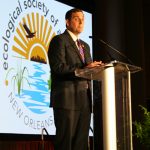 Local Impacts
Local Impacts
The Opening Plenary included greetings from President Rich Pouyat and Executive Director Catherine O’Riordan as well as Rep. Walter J. Leger III, speaker pro tempore of the Louisiana House of Representatives, who was awarded with the Regional Policy Award for his work on coastal restoration while representing districts in New Orleans.
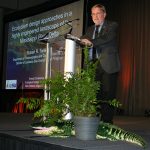 The policy plenary was keynoted by Robert Twilley, executive director of the Louisiana Sea Grant College Program and distinguished professor in the Department of Oceanography and Coastal Science at Louisiana State University, who presented “Ecosystem design approaches in a highly engineered landscape of the Mississippi River Delta.”
The policy plenary was keynoted by Robert Twilley, executive director of the Louisiana Sea Grant College Program and distinguished professor in the Department of Oceanography and Coastal Science at Louisiana State University, who presented “Ecosystem design approaches in a highly engineered landscape of the Mississippi River Delta.”
You can watch the entire plenary, which was also live-steamed, here:
Scientific Plenary
Monday’s scientific plenary kicked off with a presentation of awards to ESA’s 2018 winners (see below) and culminated in an address, “Adaptations and Resilience of Social-Ecological Systems to Extreme Events: Examples from the Caribbean,” by Ariel Lugo, the director of the USDA Forest Service International Institute of Tropical Forestry.
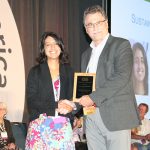 Awards and Recognition
Awards and Recognition
ESA issued its individual awards — check here for a full overview — at the Monday scientific plenary. These awardees were recognized for their outstanding contributions to ecology in new discoveries, teaching, sustainability, diversity, and lifelong commitment to the profession, while these student awardees were recognized for their outstanding research and presentations at the 2017 Annual Meeting.
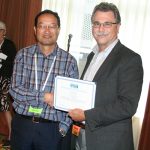 Additionally, at a special reception, fellows and early career fellows elected by the Society in 2018 were presented with their certificates and monetary awards for their major contributions and great promise to continue to make significant contributions to the science.
Additionally, at a special reception, fellows and early career fellows elected by the Society in 2018 were presented with their certificates and monetary awards for their major contributions and great promise to continue to make significant contributions to the science.
Other Scientific Talks
Following the scientific plenary, Dave Schimel delivered the keynote sponsored by the New Phytologist Trust, “Cuvettes and flux towers in the sky: the promise of contemporary remote sensing for planetary plant science.”
In a special session on Wednesday, the Recent Advances Lecture was given by Lauren Cullers (Dartmouth University) on “Mosquitoes in the Arctic: Indicators of rapid change in coupled human and natural ecosystems.”
Building a More Diverse Society
The 2018 Annual Meeting included several initiatives to support underrepresented scientists in ecology, and to help the Society grow to support them.
The Extending the Tent initiative was launched in 2017 to better serve the full spectrum of professional ecologists and those working in related fields, and to ensuring that ESA becomes more visibly inclusive and supportive of all ecologists. This initiative fully reflects demographic and cultural diversity as well as the full spectrum of career stages and employment settings.
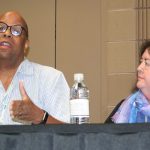 At the 2018 Annual Meeting, Extending the Tent was brought to the full membership in a special town hall chaired by current president Laura Huenneke, who led a panel of members of the Extending the Tent Task Force who explained the task force’s work to date and solicited feedback from the audience on how ESA can best reach out and support more and more diverse ecologists.
At the 2018 Annual Meeting, Extending the Tent was brought to the full membership in a special town hall chaired by current president Laura Huenneke, who led a panel of members of the Extending the Tent Task Force who explained the task force’s work to date and solicited feedback from the audience on how ESA can best reach out and support more and more diverse ecologists.
Also, the ESA booth in the exhibit hall included a feedback center for Extending the Tent. Members were encouraged to visit and fill out a feedback form to add their perspectives on how and where ESA should focus its efforts to build a bigger, stronger, more inclusive society.
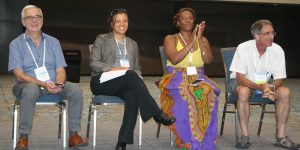 The 2018 Annual Meeting also included the Diversity Luncheon and first-ever Diversity Forum, which included panelists bringing their own unique personal and career perspectives to ecology. This celebration of diversity initiatives in ESA included a look ahead into how together, we can advance diversity, equity, inclusion and justice in the ecological sciences and within the Society.
The 2018 Annual Meeting also included the Diversity Luncheon and first-ever Diversity Forum, which included panelists bringing their own unique personal and career perspectives to ecology. This celebration of diversity initiatives in ESA included a look ahead into how together, we can advance diversity, equity, inclusion and justice in the ecological sciences and within the Society.
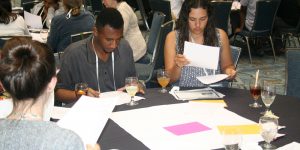 Following the Q&A with the panel, each table of attendees broke out for facilitated group work on various topics in diversity and inclusion.
Following the Q&A with the panel, each table of attendees broke out for facilitated group work on various topics in diversity and inclusion.
Ecology on Exhibit
The exhibit hall at the 2018 Annual Meeting was, as always, a hub of bustling activity throughout the week. Universities brought their pitches to attract students and postdocs, and companies showed off some of the latest technologies in everything from remote sensing to data visualization.
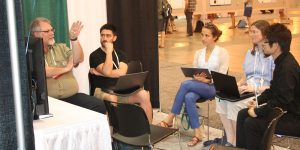 |
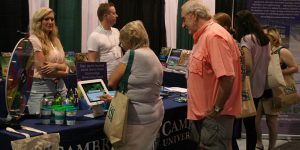 |
The exhibit hall hosted the posters as well, for daily networking and poster sessions that highlighted research from high school students to established scientists and gave ecologists a chance to present their work and get feedback from peers and mentors.
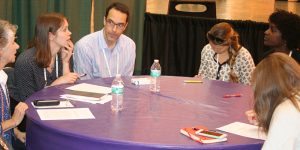 New to the exhibit hall for 2018 but an immediate hit was the ESA Career Fair, which offered opportunities for attendees to explore career pathways, get in-person feedback on their resumes, network, seek positions and participate in a great sharing of ideas around careers in ecology. Representatives from the Student Section, Early Career Section, Committee for Diversity and Education and Science Committee were involved in planning.
New to the exhibit hall for 2018 but an immediate hit was the ESA Career Fair, which offered opportunities for attendees to explore career pathways, get in-person feedback on their resumes, network, seek positions and participate in a great sharing of ideas around careers in ecology. Representatives from the Student Section, Early Career Section, Committee for Diversity and Education and Science Committee were involved in planning.
And of course, the exhibit hall was home to tables for ESA’s sections and chapters. Members could browse among the different geographic, disciplinary or interest groups, join up, network or even just connect with colleagues and participate in fun activities like Sketch Your Science (courtesy of the Communication and Engagement Section) or building their own microbes with pipe cleaners with the Microbial Ecology Section.
Society Leadership
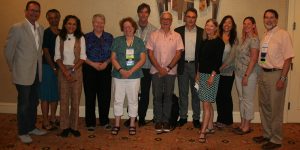 In the opening days of the Annual Meeting, ESA’s Governing Board met to consider the state of the Society. They received reports from the staff, editors in chief and other volunteers and considered new business. ESA thanked Nalini Nadkarni, Emily Cloyd and Sharon Hall for their service and welcomed Pamela Templer, Kathleen Treseder and Manuel Morales as new members.
In the opening days of the Annual Meeting, ESA’s Governing Board met to consider the state of the Society. They received reports from the staff, editors in chief and other volunteers and considered new business. ESA thanked Nalini Nadkarni, Emily Cloyd and Sharon Hall for their service and welcomed Pamela Templer, Kathleen Treseder and Manuel Morales as new members.
The ESA Council, which includes the Governing Board and the chairs of each of ESA’s committees, chapters and sections, also convened at the Annual Meeting. After new members of the Council were given an orientation as to their responsibilities and how to work with ESA’s staff, the entire Council met to take up items of governance for the Society and to approve the budget for 2019.
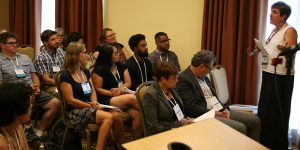 |
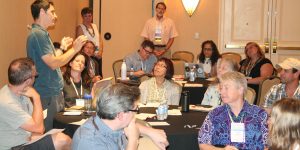 |
